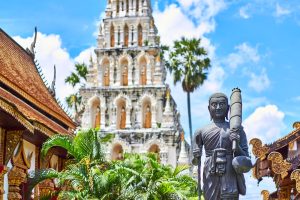Thailand’s tourism industry has experienced significant growth over the years, attracting millions of visitors from around the world. Known for its stunning beaches, vibrant cities, and rich cultural heritage, Thailand has become a popular destination for travelers seeking a unique and memorable experience. While the country offers a plethora of well-known tourist attractions, there is much more to discover beyond the surface. Exploring the authentic side of Thailand allows travelers to immerse themselves in the local culture, traditions, and hidden gems that make this country truly special.
Exploring Thailand’s Hidden Gems: A Journey to the Authentic Side
While popular destinations like Bangkok, Phuket, and Chiang Mai offer incredible experiences, there is something magical about venturing off the beaten path and discovering Thailand’s hidden gems. These lesser-known destinations provide a glimpse into the authentic side of Thailand, away from the crowds and tourist traps. From secluded islands to remote villages nestled in the mountains, these hidden gems offer a unique and unforgettable experience.
One of the benefits of visiting off-the-beaten-path locations is the opportunity to escape the crowds and experience a more peaceful and serene environment. These hidden gems often have fewer tourists, allowing travelers to truly connect with nature and immerse themselves in the local culture. Additionally, exploring lesser-known destinations supports local communities and helps to distribute tourism revenue more evenly throughout the country.
Some examples of hidden gems in Thailand include Koh Lipe, a small island in the Andaman Sea known for its crystal-clear waters and vibrant marine life; Pai, a picturesque town in the mountains of northern Thailand famous for its hot springs and waterfalls; and Koh Yao Noi, a quiet island located between Phuket and Krabi known for its pristine beaches and traditional way of life.
5 Unique Ways to Experience Local Culture in Thailand
Thai culture is rich and diverse, with influences from Buddhism, Hinduism, and various ethnic groups. To truly experience the local culture, there are several unique activities and experiences that travelers can partake in. One example is participating in a traditional Thai cooking class, where you can learn to prepare authentic Thai dishes using fresh ingredients and traditional techniques. This not only allows you to taste the flavors of Thailand but also provides insight into the country’s culinary traditions.
Another unique cultural experience in Thailand is attending a Muay Thai match. Muay Thai, also known as Thai boxing, is the national sport of Thailand and has a long history dating back centuries. Watching a match allows you to witness the skill, agility, and strength of the fighters while immersing yourself in the excitement and energy of this traditional sport.
Participating in a traditional Thai massage is another way to experience the local culture. Thai massage is a unique form of bodywork that combines acupressure, stretching, and yoga-like movements. Learning the art of Thai massage not only provides relaxation and rejuvenation but also allows you to connect with the ancient healing traditions of Thailand.
From Street Food to Fine Dining: A Culinary Adventure in Thailand
Thai cuisine is renowned worldwide for its bold flavors, aromatic spices, and fresh ingredients. From street food stalls to fine dining restaurants, Thailand offers a wide range of culinary experiences for food lovers. Exploring the local cuisine is not only a delicious adventure but also an opportunity to learn about the country’s culinary traditions and cultural heritage.
Street food is an integral part of Thai culture and can be found on almost every corner. From Pad Thai and Tom Yum soup to Mango Sticky Rice and Satay skewers, there is no shortage of mouthwatering dishes to try. Eating street food allows you to interact with local vendors, experience the vibrant atmosphere of the markets, and taste authentic flavors that are often passed down through generations.
For those seeking a more refined dining experience, Thailand also offers a plethora of fine dining options. From Michelin-starred restaurants to hidden gems tucked away in the countryside, these establishments showcase the creativity and innovation of Thai chefs. Fine dining in Thailand often combines traditional Thai flavors with modern techniques, resulting in a unique and unforgettable culinary experience.
Discovering the Rich History and Traditions of Thailand
Thailand has a rich history and a deep-rooted cultural heritage that can be explored through its historical and cultural sites. From ancient temples and palaces to traditional villages and museums, there are countless opportunities to learn about the country’s past and traditions.
One of the most iconic historical sites in Thailand is the ancient city of Ayutthaya, located just north of Bangkok. Once the capital of the Kingdom of Siam, Ayutthaya is now a UNESCO World Heritage Site and home to numerous temples, ruins, and historical landmarks. Exploring this ancient city allows visitors to step back in time and witness the grandeur of the Siamese empire.
Another must-visit destination for history enthusiasts is Sukhothai, another UNESCO World Heritage Site. Known as the birthplace of Thai civilization, Sukhothai was once the capital of the Kingdom of Sukhothai and is home to numerous well-preserved temples and statues. Exploring this ancient city provides insight into Thailand’s early history and architectural achievements.
In addition to historical sites, Thailand also has a rich tradition of performing arts. Traditional Thai dance, music, and puppetry are an integral part of the country’s cultural heritage. Attending a traditional dance performance or puppet show allows visitors to witness the grace, beauty, and intricacy of these art forms while gaining a deeper understanding of Thai culture.
Off the Beaten Path: Exploring Thailand’s Lesser-Known Destinations

While popular tourist destinations like Bangkok and Phuket offer incredible experiences, there is something special about exploring Thailand’s lesser-known destinations. These hidden gems provide a unique and authentic experience, away from the crowds and tourist traps.
One of the benefits of exploring lesser-known destinations is the opportunity to escape the hustle and bustle of the city and immerse yourself in nature. Thailand is home to stunning national parks, lush rainforests, and pristine beaches that are often overlooked by tourists. Visiting these off-the-beaten-path locations allows travelers to connect with nature, enjoy outdoor activities like hiking and snorkeling, and experience the beauty of Thailand’s natural landscapes.
Additionally, exploring lesser-known destinations supports local communities and helps to distribute tourism revenue more evenly throughout the country. Many of these hidden gems are located in rural areas where tourism plays a vital role in the local economy. By visiting these destinations, travelers can contribute to sustainable tourism practices and support local businesses and communities.
Some examples of lesser-known destinations in Thailand include Khao Sok National Park, a stunning rainforest located in southern Thailand known for its limestone cliffs, emerald-green lakes, and diverse wildlife; Nan, a charming town in northern Thailand famous for its well-preserved temples and traditional wooden houses; and Koh Chang, an island in the Gulf of Thailand known for its pristine beaches, waterfalls, and coral reefs.
Embracing Nature: Eco-Tourism Adventures in Thailand
Thailand is known for its stunning natural landscapes, from lush rainforests and national parks to pristine beaches and coral reefs. Embracing eco-tourism allows travelers to explore these natural wonders while minimizing their impact on the environment.
Eco-tourism in Thailand focuses on sustainable practices that promote conservation, community involvement, and education. There are numerous eco-tourism activities available for travelers to enjoy, such as hiking through national parks, kayaking through mangrove forests, snorkeling or diving in marine protected areas, and participating in wildlife conservation projects.
One of the benefits of eco-tourism in Thailand is the opportunity to connect with nature and experience the country’s biodiversity up close. Thailand is home to a wide range of plant and animal species, including elephants, tigers, gibbons, and numerous bird species. By participating in eco-tourism activities, travelers can witness these incredible creatures in their natural habitats while supporting conservation efforts.
Additionally, eco-tourism in Thailand provides opportunities for cultural exchange and community involvement. Many eco-tourism projects are run by local communities, allowing travelers to learn about traditional ways of life, support local businesses, and contribute to sustainable development.
Immersing Yourself in the Local Lifestyle: Homestays in Thailand
For travelers seeking a more immersive cultural experience, homestays offer a unique opportunity to live with local families and experience the daily life of Thai people. Homestays provide a glimpse into the local lifestyle, traditions, and customs, allowing travelers to forge meaningful connections and gain a deeper understanding of Thai culture.
Homestays in Thailand can range from simple accommodations in rural villages to more luxurious options in traditional Thai houses or eco-lodges. Staying with a local family allows travelers to participate in daily activities such as cooking traditional meals, farming, fishing, or even learning traditional crafts or martial arts.
One of the benefits of homestays is the opportunity to support local communities and contribute to sustainable tourism practices. By staying with local families, travelers can directly support the local economy and help to preserve traditional ways of life. Additionally, homestays often provide income-generating opportunities for women and marginalized communities, empowering them economically and socially.
Some examples of homestay experiences in Thailand include staying with a hill tribe community in northern Thailand, where you can learn about their unique customs and traditions; living with a fishing community in southern Thailand and participating in their daily activities; or staying with a farming family in the countryside and learning about organic farming practices.
Learning the Art of Thai Massage and Wellness Practices
Thai massage is a traditional healing practice that has been passed down through generations in Thailand. It combines acupressure, stretching, and yoga-like movements to promote relaxation, relieve muscle tension, and improve overall well-being. Learning the art of Thai massage allows travelers to not only experience the therapeutic benefits but also gain insight into the country’s wellness traditions.
There are numerous opportunities to learn Thai massage in Thailand, ranging from short courses for beginners to more in-depth training programs for those seeking to become certified practitioners. These courses often take place in traditional settings such as temples or wellness centers, providing a serene and peaceful environment for learning.
In addition to Thai massage, Thailand offers a wide range of wellness practices that promote physical and mental well-being. From yoga and meditation retreats to herbal medicine workshops and traditional healing ceremonies, there are countless opportunities to immerse yourself in the country’s wellness traditions.
One of the benefits of learning Thai massage and wellness practices is the opportunity to take these skills home with you. Whether you are a professional massage therapist or simply interested in self-care, learning Thai massage techniques can be a valuable skill that you can continue to practice and share with others.
Celebrating Festivals and Cultural Events in Thailand
Thailand is known for its vibrant festivals and cultural events, which provide a unique opportunity to immerse yourself in the local culture and traditions. From religious ceremonies to colorful parades and lively street parties, these festivals showcase the diversity and vibrancy of Thai culture.
One of the most famous festivals in Thailand is Songkran, the Thai New Year celebration. Taking place in April, Songkran is known for its water fights and street parties, where locals and tourists alike come together to splash water on each other as a symbol of cleansing and renewal. Participating in Songkran allows travelers to experience the joy and excitement of this traditional festival while cooling off from the hot Thai weather.
Another popular festival in Thailand is Loy Krathong, also known as the Festival of Lights. Taking place in November, Loy Krathong is a time to pay respects to the water goddess and release floating lanterns and small boats made of banana leaves onto rivers and lakes. This magical festival is celebrated throughout the country and provides a beautiful and serene experience.
In addition to these major festivals, Thailand also celebrates numerous cultural events throughout the year, such as the Phi Ta Khon Ghost Mask Festival in Loei, the Vegetarian Festival in Phuket, and the Lantern Festival in Chiang Mai. Attending these events allows travelers to witness traditional rituals, costumes, music, and dance while gaining a deeper appreciation for Thai culture.
Supporting Local Communities: Volunteering and Giving Back in Thailand
For travelers who want to make a positive impact during their visit to Thailand, there are numerous volunteer opportunities available that allow you to support local communities and give back. Whether it’s teaching English to children, working on conservation projects, or assisting with community development initiatives, volunteering provides a meaningful way to connect with locals and contribute to sustainable development.
There are various organizations and NGOs in Thailand that facilitate volunteer programs across different sectors, including education, healthcare, environmental conservation, and community development. These programs often provide accommodation, meals, and support throughout your volunteering experience.
One of the benefits of volunteering in Thailand is the opportunity to gain a deeper understanding of the local culture and traditions. By working closely with local communities, you can learn about their way of life, challenges they face, and their aspirations for the future. This cultural exchange allows for meaningful connections and personal growth.
Additionally, volunteering in Thailand allows travelers to make a positive impact on local communities and contribute to sustainable development. By supporting education initiatives, conservation projects, or community development programs, volunteers can help to improve the lives of local people and protect the country’s natural resources.
Thailand offers a wealth of opportunities for travelers to explore the authentic side of the country and immerse themselves in its culture, traditions, and natural beauty. From hidden gems and unique cultural experiences to culinary adventures and eco-tourism activities, there is something for everyone in this diverse and vibrant country.
By venturing off the beaten path, supporting local communities, and embracing the local lifestyle, travelers can create meaningful connections, gain a deeper understanding of Thai culture, and make a positive impact. So, whether you’re seeking relaxation, adventure, or cultural immersion, Thailand is waiting to welcome you with open arms.
Looking for authentic experiences in Thailand? Look no further! Check out this amazing article on thaitourism.net that highlights the best ways to immerse yourself in the rich culture and traditions of Thailand. From exploring ancient temples to indulging in mouthwatering street food, this article offers a comprehensive guide to experiencing the true essence of Thailand. Don’t miss out on this incredible opportunity to discover the hidden gems of this beautiful country. Click here to read more and start planning your unforgettable Thai adventure!
FAQs
What are some authentic experiences to have in Thailand?
Thailand offers a variety of authentic experiences such as visiting local markets, trying street food, participating in a traditional Thai cooking class, exploring ancient temples, and taking part in a Thai massage.
What is the best time to visit Thailand?
The best time to visit Thailand is from November to February when the weather is cooler and drier. However, this is also the peak tourist season, so expect higher prices and larger crowds.
What is the currency used in Thailand?
The currency used in Thailand is the Thai baht (THB).
What is the official language of Thailand?
The official language of Thailand is Thai.
What is the dress code for visiting temples in Thailand?
Visitors to temples in Thailand are expected to dress modestly and cover their shoulders and knees. Shoes must be removed before entering the temple.
What is the transportation system like in Thailand?
Thailand has a variety of transportation options including tuk-tuks, taxis, buses, and trains. The BTS Skytrain and MRT subway systems are also available in Bangkok.
What is the food like in Thailand?
Thai cuisine is known for its bold flavors and use of fresh herbs and spices. Popular dishes include pad Thai, green curry, and tom yum soup.
What is the nightlife like in Thailand?
Thailand has a vibrant nightlife scene with options ranging from night markets and street food vendors to bars and nightclubs. Bangkok and Phuket are particularly known for their nightlife.




